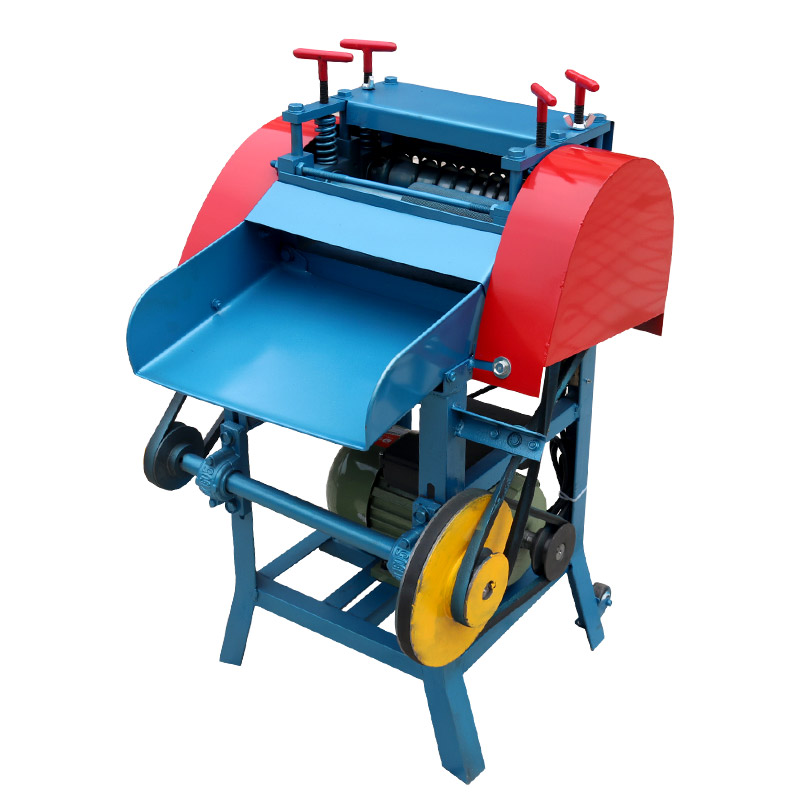

Nov . 05, 2024 14:53 Back to list
The Importance of Scrap Iron Shredders in Recycling Industry
In an era where sustainability has become a crucial focus for industries worldwide, the role of scrap iron shredders has emerged as a pivotal element in the recycling sector. Scrap iron shredders are specialized machines designed to process scrap metal, transforming large pieces of iron and steel into manageable, reusable forms. This reduction in size aids not only in logistics but also prepares materials for further recycling processes. With the increasing demand for recycled materials and the need for effective waste management systems, understanding the significance of scrap iron shredders is more pertinent than ever.
Functionality and Mechanism
Scrap iron shredders typically consist of heavy-duty blades engineered to crush and shred iron and steel into smaller fragments. The process begins when large pieces of scrap metal are fed into the shredder. These machines can handle a variety of metals, including old vehicles, construction scraps, and industrial by-products. Once the material is fed into the machine, a series of powerful blades rotate at high speeds, reducing the scrap metal into smaller pieces, often less than six inches in size.
The shredded metal can then be easily transported, sorted, and melted down for recycling. This not only conserves natural resources but also significantly reduces the energy consumption associated with manufacturing new metals from raw ores. Recycling scrap iron requires up to 70% less energy compared to the production of new steel, making shredders indispensable in enhancing energy efficiency in the metal industry.
Environmental Benefits
The environmental benefits of scrap iron shredders are far-reaching
. By promoting the recycling of metals, these machines play an essential role in diverting waste from landfills. The traditional practice of disposing of scrap metal not only wastes resources but also contributes to the growing issues of pollution and environmental degradation. By utilizing shredding technology, scrap metals can be repurposed, reducing the need for mining operations which are often associated with significant ecological harm.Additionally, shredders help in minimizing the carbon footprint of the metal production process. As recycled metals require less energy to process, the emissions associated with their production are also substantially lower. In a world grappling with climate change, adopting technologies that enhance recycling efficiency brings us one step closer to achieving sustainability goals.

Economic Impact
The economic implications of scrap iron shredders cannot be overlooked. The growing demand for recycled metals has seen the establishment of many recycling facilities utilizing shredding technology. These facilities create job opportunities within local communities, from machine operators to logistics personnel. Furthermore, the availability of cost-effective recycled materials in the market can lead to lower prices for consumers while providing manufacturers with a sustainable material source.
Moreover, the financial motivations for recycling metals can be significant. Scrap metal has a global market, and as prices fluctuate, a well-run shredding facility can turn a profit by collecting, processing, and selling recycled materials. This economic viability not only benefits individual businesses but also boosts local economies, encouraging a sustainable approach to resources.
Future Outlook
Looking ahead, the future of scrap iron shredders appears promising. With advancing technologies, shredders are becoming more efficient, producing cleaner and more uniformly sized metal shreds. Innovations such as automation, artificial intelligence, and advanced sorting systems are set to further enhance their effectiveness.
As the shift toward greener practices continues across industries, the demand for metal shredding solutions is expected to grow. New regulations aimed at promoting recycling and reducing waste will likely drive investments in shredding technologies, ensuring that these machines remain at the forefront of metal recycling processes.
In conclusion, scrap iron shredders play an essential role in the recycling industry by enabling efficient processing of scrap metals, reducing environmental impacts, and providing economic opportunities. As the world continues to prioritize sustainability, the significance of these machines is only set to increase, making them a vital component in the journey toward a circular economy. Disposing of metals responsibly not only preserves natural resources but also contributes to a healthier planet for future generations.
Latest news
Troubleshooting Common Eddy Separator Problems
NewsJul.04,2025
The Role of Metal Recycling Plants in Circular Economy
NewsJul.04,2025
The Impact of Recycling Line Pickers on Waste Management Costs
NewsJul.04,2025
Safety Features Every Metal Shredder Should Have
NewsJul.04,2025
How Industrial Shredders Improve Waste Management Systems
NewsJul.04,2025
How Cable Granulators Contribute to Sustainable Recycling
NewsJul.04,2025